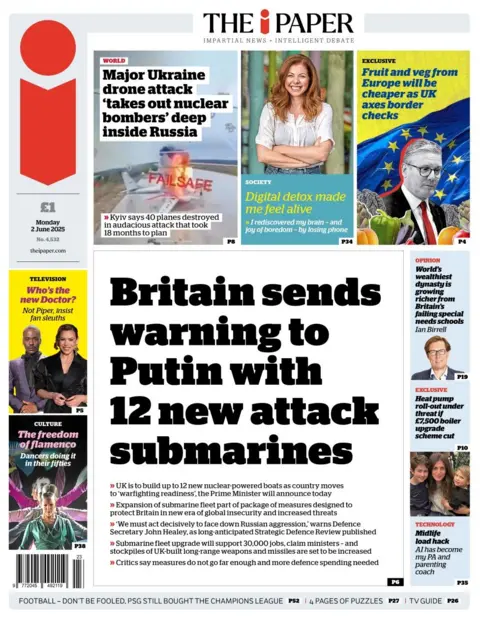The landscape of British media is buzzing with a prominent headline that underscores a serious concern: “The UK sends warning to Putin.” This stark message is highlighted in the daily news cycle, particularly amid strategic military developments that include the introduction of twelve new attack submarines. The significance of this naval enhancement is not lost on observers; it is projected to bolster national security and potentially support up to 30,000 jobs in the defense sector.
As political tensions mount, Sir Keir Starmer’s comprehensive strategic defense review takes center stage, with further details expected to unveil the government’s military priorities amidst an evolving geopolitical landscape. However, there are doubts about the feasibility of these plans, with some skeptics questioning whether they can be successfully implemented. This sentiment is echoed across various media outlets, as they weigh the implications of these defense strategies against the backdrop of recent conflicts, particularly concerning Ukraine.
The latest reporting also reflects the immediate challenges facing the UK, notably the rising number of immigrants crossing the English Channel. Defense Secretary John Healey recently stated, “We’ve lost control,” in regard to the immigration crisis, highlighting a significant issue that crosses party lines. The surge in migrant crossings peaked with a record 1,194 people arriving in a single day, prompting headlines across various newspapers and giving rise to fervent discussions about national border security.
Furthermore, the media landscape is diverse, with each publication echoing the concerns of the day while also delving into unique narratives. For example, the Daily Telegraph reported on the fallout of Healey’s comments, suggesting a retreat from prior commitments to increase defense spending to 3% of GDP by 2034. Instead of a firm commitment, Healey offered his statements as ambitions, demonstrating a cautious approach as the government reevaluates its fiscal responsibilities in the defense sector.
On the social front, lighter stories have also made waves, such as the celebration of iconic British pop culture influences. The Daily Mail presented a whimsical headline featuring Mel B (from the Spice Girls) celebrating her 50th birthday, joking that the papers must not forget the human aspects amidst political turmoil. Meanwhile, in the realm of health and wellness, the Guardian reported that regular exercise might be more effective than drugs in preventing cancer recurrence—a claim bolstered by a significant new study.
In another part of the news cycle, the implications of the invasion of Ukraine by Russia remain a focal point. The imagery of Ukrainian drone strikes on Russian airbases captivates readers, especially as they delve into the notion of warfare in the modern age. Reports indicate that these drone operations have successfully targeted nuclear-capable bombers, showcasing a shift in battlefield dynamics and strategy.
Contrasting these heavy topics, the Financial Times alerts its readers about a commitment from the U.S. Treasury Secretary to ensure that the U.S. will never default on its debts, providing comfort amidst rising investor anxiety regarding the national debt. This assurance plays into larger economic narratives as the world grapples with considerable fiscal challenges post-global crises.
As the media reels through a range of topics—military, political, and social—the Daily Star encapsulated the mood with headlines that blend serious and lighthearted journalism: “Wish you were beer?” It serves not only to entertain but also reflects the British spirit, juxtaposing the trivial with the tremendous.
Ultimately, the first pages of numerous newspapers not only provide a reflection of current events but ensure readers are attuned to the complexities and contradictions of contemporary society, from strategic military decisions to poignant personal stories. A close examination of these daily publications reveals how the UK media attempts to balance pressing global issues with cultural narratives, creating a multifaceted portrait of British life in 2025.



